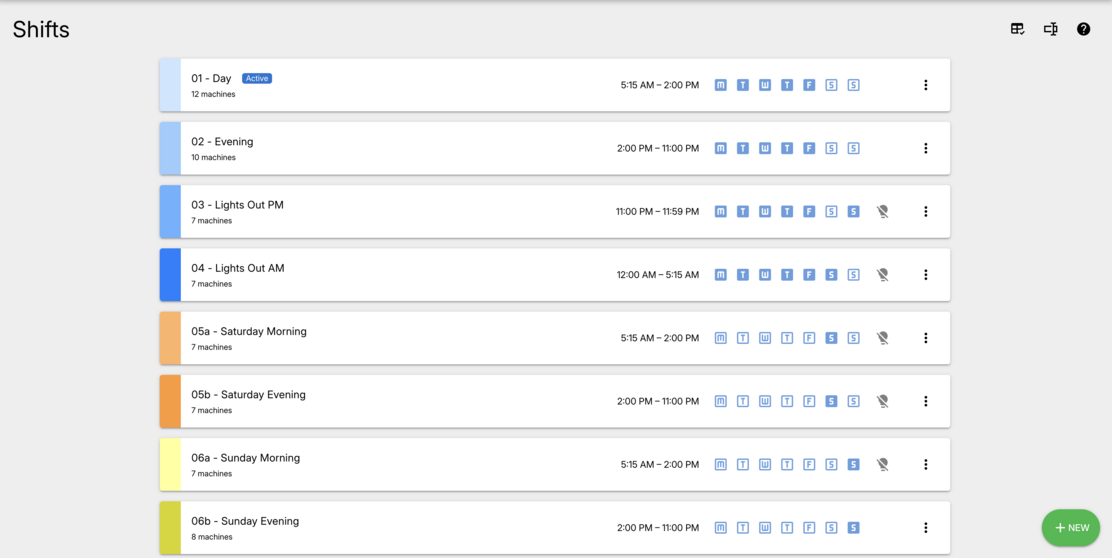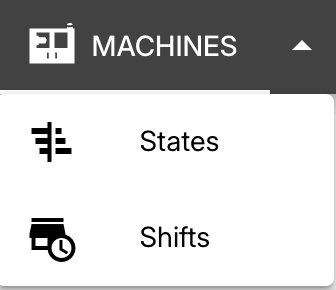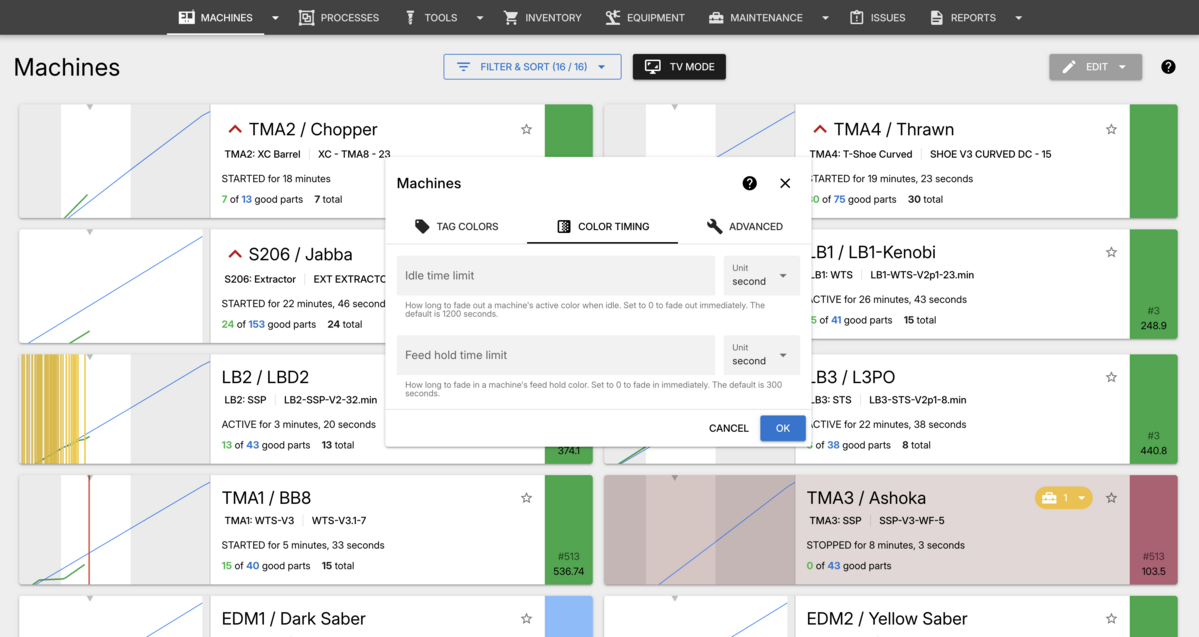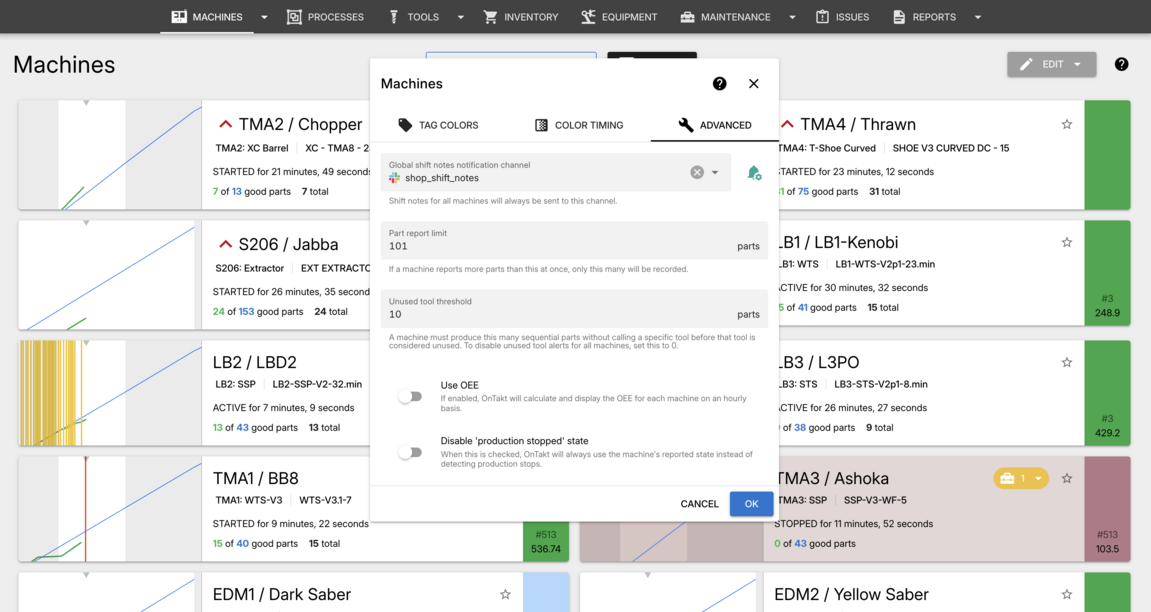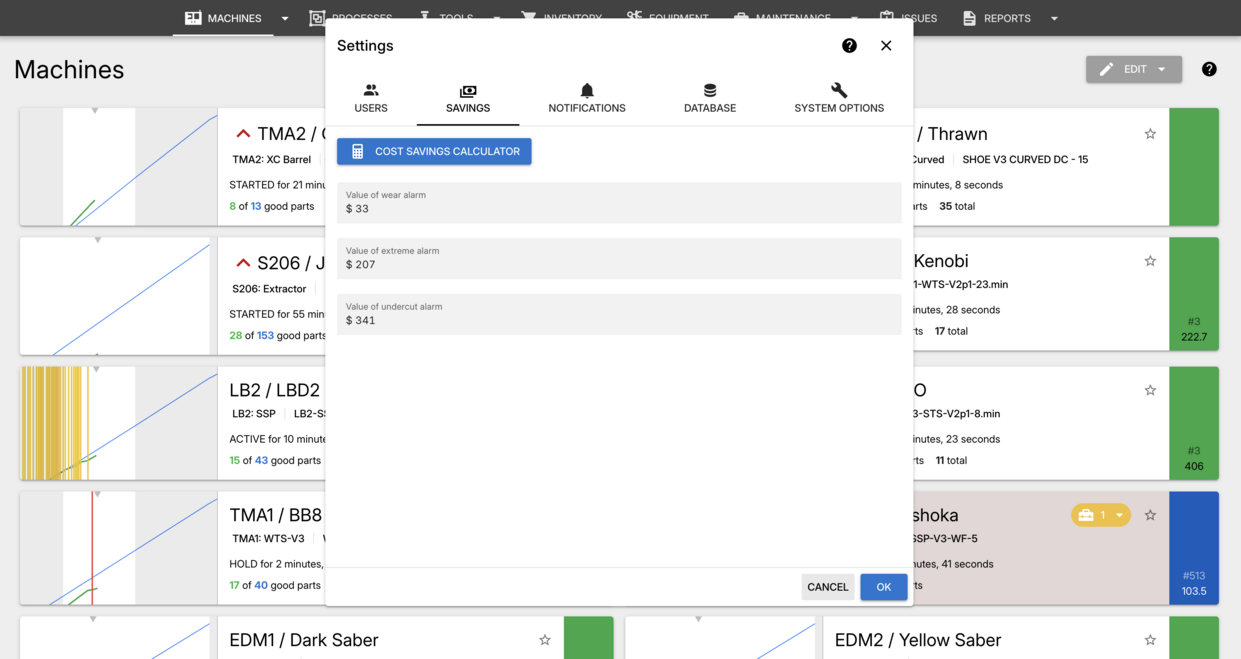No edit summary |
No edit summary |
||
| Line 43: | Line 43: | ||
==User management== | ==User management== | ||
* To manage users: click on current profile in the top right of the screen, click on "Global Settings", and navigate to the Users Tab. Click "Add" and set the username, password, active status, access level, kudos emoji, | *To manage users: click on current profile in the top right of the screen, click on "Global Settings", and navigate to the Users Tab. Click "Add" and set the username, password, active status, access level, kudos emoji, | ||
* To change a user's password: click the Edit button next to that user and enter a new password. | *To change a user's password: click the Edit button next to that user and enter a new password. | ||
* To prevent a user from logging in without deleting their account: switch off the Active option in the user editor. | *To prevent a user from logging in without deleting their account: switch off the Active option in the user editor. | ||
<html> | |||
<div style="position: relative; padding-bottom: 64.86486486486486%; height: 0;"><iframe src="https://www.loom.com/embed/659c1c41f21c45a2a908eb0cd7651630?sid=86d93479-06c7-4bc3-9695-0123eb8c4710" frameborder="0" webkitallowfullscreen mozallowfullscreen allowfullscreen style="position: absolute; top: 0; left: 0; width: 100%; height: 100%;"></iframe></div> | |||
</html> | |||
===Access levels=== | ===Access levels=== | ||
| Line 68: | Line 70: | ||
!Perform system check | !Perform system check | ||
|✓ | |✓ | ||
|✓ | | ✓ | ||
|✓ | |✓ | ||
|✓ | |✓ | ||
| Line 74: | Line 76: | ||
!Dismiss alerts | !Dismiss alerts | ||
|✓ | |✓ | ||
|✓ | | ✓ | ||
|✓ | |✓ | ||
| | | | ||
| Line 87: | Line 89: | ||
|- | |- | ||
!View/chart machines | !View/chart machines | ||
|✓ | |✓ | ||
|✓ | |✓ | ||
|✓ | |✓ | ||
| Line 94: | Line 96: | ||
!Modify basic machine options | !Modify basic machine options | ||
|✓ | |✓ | ||
|✓ | |✓ | ||
| | | | ||
| | | | ||
| Line 116: | Line 118: | ||
| | | | ||
|- | |- | ||
! colspan="5" |'''Programs''' | ! colspan="5" | '''Programs''' | ||
|- | |- | ||
!View/chart programs and processes | !View/chart programs and processes | ||
| Line 174: | Line 176: | ||
| | | | ||
|- | |- | ||
!Add tools to tool assemblies | !Add tools to tool assemblies | ||
|✓ | |✓ | ||
|✓ | |✓ | ||
| Line 188: | Line 190: | ||
! colspan="5" |'''Parts''' | ! colspan="5" |'''Parts''' | ||
|- | |- | ||
!View/chart parts | !View/chart parts | ||
|✓ | |✓ | ||
|✓ | |✓ | ||
| Line 215: | Line 217: | ||
|✓ | |✓ | ||
|✓ | |✓ | ||
|✓ | | ✓ | ||
| | | | ||
|- | |- | ||
| Line 226: | Line 228: | ||
! colspan="5" |'''Quality''' | ! colspan="5" |'''Quality''' | ||
|- | |- | ||
!View/chart AutoComp data | !View/chart AutoComp data | ||
|✓ | |✓ | ||
|✓ | |✓ | ||
|✓ | |||
| ✓ | |||
|- | |- | ||
! colspan="5" |'''Reports''' | ! colspan="5" |'''Reports''' | ||
|- | |- | ||
!Generate reports | !Generate reports | ||
| ✓ | |||
|✓ | |||
|✓ | |✓ | ||
|✓ | |✓ | ||
|✓ | |||
|- | |- | ||
! colspan="5" |'''Options''' | ! colspan="5" |'''Options''' | ||
|- | |- | ||
!Modify options | ! Modify options | ||
|✓ | |✓ | ||
|✓ | |✓ | ||
| | | | ||
| Line 256: | Line 258: | ||
!View plugin logs | !View plugin logs | ||
|✓ | |✓ | ||
| ✓ | |||
|✓ | |✓ | ||
| ✓ | |||
|✓ | |||
|- | |- | ||
!Install and uninstall plugins | !Install and uninstall plugins | ||
| Line 267: | Line 269: | ||
|} | |} | ||
==Time zone== | ==Time zone == | ||
A production day as displayed on charts will be defined in this time zone. It is also used for server-side time-based events such as notifications and reports. Except where otherwise specified, times are displayed in the browser's local time zone regardless of this setting. | A production day as displayed on charts will be defined in this time zone. It is also used for server-side time-based events such as notifications and reports. Except where otherwise specified, times are displayed in the browser's local time zone regardless of this setting. | ||
| Line 276: | Line 278: | ||
Steps to select time zone: | Steps to select time zone: | ||
# Click on the profile name in the top right hand corner of the screen, select "global settings" | #Click on the profile name in the top right hand corner of the screen, select "global settings" | ||
# Go to the "System Options" tab, chose the desired time zone | #Go to the "System Options" tab, chose the desired time zone | ||
[[File:Ontakt Settings - Time Zone.mov|800px|frameless|center]] | [[File:Ontakt Settings - Time Zone.mov|800px|frameless|center]] | ||
| Line 284: | Line 286: | ||
==Notification setup== | ==Notification setup== | ||
===Slack Setup=== | ===Slack Setup === | ||
This must be done by a workspace administrator. | This must be done by a workspace administrator. | ||
#Go to https://api.slack.com/apps | #Go to https://api.slack.com/apps | ||
| Line 291: | Line 293: | ||
#Enter an app name ("OnTakt" works just fine) and choose the correct workspace, then click Create App | #Enter an app name ("OnTakt" works just fine) and choose the correct workspace, then click Create App | ||
#Under "Add features and functionality", click Incoming Webhooks | #Under "Add features and functionality", click Incoming Webhooks | ||
#Turn on the switch at the top right to activate incoming webhooks | # Turn on the switch at the top right to activate incoming webhooks | ||
#For each channel you want OnTakt to post to: | #For each channel you want OnTakt to post to: | ||
##Click the Add New Webhook to Workspace button at the bottom | ## Click the Add New Webhook to Workspace button at the bottom | ||
##In the page that opens, choose the channel you want to post to and click Allow | ##In the page that opens, choose the channel you want to post to and click Allow | ||
##Copy the Webhook URL from the list (make sure it's for the right channel) | ##Copy the Webhook URL from the list (make sure it's for the right channel) | ||
| Line 302: | Line 304: | ||
#Click Incoming Webhooks under Features in the left sidebar | #Click Incoming Webhooks under Features in the left sidebar | ||
If you would like the app to add an icon to the bot that posts messages: | If you would like the app to add an icon to the bot that posts messages: | ||
#Go to https://api.slack.com/apps | # Go to https://api.slack.com/apps | ||
#Click the name of the OnTakt app from the list | #Click the name of the OnTakt app from the list | ||
#Scroll down to Display Information | #Scroll down to Display Information | ||
| Line 309: | Line 311: | ||
===Microsoft Teams Setup=== | ===Microsoft Teams Setup=== | ||
This must be done by a team administrator. | This must be done by a team administrator. | ||
#Go to https://teams.microsoft.com/l/app/203a1e2c-26cc-47ca-83ae-be98f960b6b2 | #Go to https://teams.microsoft.com/l/app/203a1e2c-26cc-47ca-83ae-be98f960b6b2 | ||
#Click the "Add to a team" button | #Click the "Add to a team" button | ||
#Search for the channel you want to send notifications to | #Search for the channel you want to send notifications to | ||
#Click the "Set up a connector" button | # Click the "Set up a connector" button | ||
#When the configuration page opens, enter any name, such as "OnTakt" | #When the configuration page opens, enter any name, such as "OnTakt" | ||
#You can choose any icon, but here is the OnTakt logo | #You can choose any icon, but here is the OnTakt logo | ||
#Click the "Create" button | #Click the "Create" button | ||
#After the page reloads, scroll to the bottom and copy the URL it provides | #After the page reloads, scroll to the bottom and copy the URL it provides | ||
#Click "Done" | # Click "Done" | ||
#Paste this URL into the machine's Microsoft Teams Webhook URL field in OnTakt | #Paste this URL into the machine's Microsoft Teams Webhook URL field in OnTakt | ||
=== Email setup === | ===Email setup=== | ||
A notification channel can have an email address instead of a webhook URL, however, sending email will not work until an email server is configured. To do this, visit the Notifications tab of the global settings window inside OnTakt and fill in the following fields: | A notification channel can have an email address instead of a webhook URL, however, sending email will not work until an email server is configured. To do this, visit the Notifications tab of the global settings window inside OnTakt and fill in the following fields: | ||
* '''Server host:''' IP address or hostname of the SMTP server. | *'''Server host:''' IP address or hostname of the SMTP server. | ||
* '''Server port:''' usually 587 for TLS connections or 25 for unencrypted connections. | *'''Server port:''' usually 587 for TLS connections or 25 for unencrypted connections. | ||
* '''Secure with TLS:''' strongly recommended, but requires the SMTP server to support it. SSL is much less secure and therefore not supported. | *'''Secure with TLS:''' strongly recommended, but requires the SMTP server to support it. SSL is much less secure and therefore not supported. | ||
* '''Username:''' username to log into the SMTP server with. | *'''Username:''' username to log into the SMTP server with. | ||
* '''Password:''' password to log into the SMTP server with. | *'''Password:''' password to log into the SMTP server with. | ||
* '''From email address:''' emails will appear to be from this address. Defaults to the SMTP username if not set. | *'''From email address:''' emails will appear to be from this address. Defaults to the SMTP username if not set. | ||
The correct values for these fields depends on your email provider. Instructions for common providers can be found here: | The correct values for these fields depends on your email provider. Instructions for common providers can be found here: | ||
* [https://support.google.com/a/answer/176600 Google Workspace] | *[https://support.google.com/a/answer/176600 Google Workspace] | ||
* [https://support.google.com/mail/answer/7126229 Gmail] | *[https://support.google.com/mail/answer/7126229 Gmail] | ||
* [https://support.microsoft.com/en-us/office/pop-imap-and-smtp-settings-8361e398-8af4-4e97-b147-6c6c4ac95353 Microsoft 365] | *[https://support.microsoft.com/en-us/office/pop-imap-and-smtp-settings-8361e398-8af4-4e97-b147-6c6c4ac95353 Microsoft 365] | ||
* [https://support.microsoft.com/en-us/office/pop-imap-and-smtp-settings-for-outlook-com-d088b986-291d-42b8-9564-9c414e2aa040 Microsoft Outlook.com] | *[https://support.microsoft.com/en-us/office/pop-imap-and-smtp-settings-for-outlook-com-d088b986-291d-42b8-9564-9c414e2aa040 Microsoft Outlook.com] | ||
* [https://support.apple.com/en-us/HT202304 iCloud Mail] | *[https://support.apple.com/en-us/HT202304 iCloud Mail] | ||
* [https://www.zoho.com/mail/help/zoho-smtp.html Zoho Mail] | *[https://www.zoho.com/mail/help/zoho-smtp.html Zoho Mail] | ||
* [https://help.yahoo.com/kb/SLN4075.html Yahoo Mail] | *[https://help.yahoo.com/kb/SLN4075.html Yahoo Mail] | ||
For accounts with multi-factor authentication enabled, you will need to create and use an '''app password''' for OnTakt. Instructions for common providers can be found here: | For accounts with multi-factor authentication enabled, you will need to create and use an '''app password''' for OnTakt. Instructions for common providers can be found here: | ||
* [https://knowledge.workspace.google.com/kb/how-to-create-app-passwords-000009237 Google Workspace] | *[https://knowledge.workspace.google.com/kb/how-to-create-app-passwords-000009237 Google Workspace] | ||
* [https://support.google.com/accounts/answer/185833?hl=en Gmail] | *[https://support.google.com/accounts/answer/185833?hl=en Gmail] | ||
* [https://support.microsoft.com/en-us/account-billing/manage-app-passwords-for-two-step-verification-d6dc8c6d-4bf7-4851-ad95-6d07799387e9 Microsoft 365] | *[https://support.microsoft.com/en-us/account-billing/manage-app-passwords-for-two-step-verification-d6dc8c6d-4bf7-4851-ad95-6d07799387e9 Microsoft 365] | ||
* [https://support.microsoft.com/en-us/account-billing/using-app-passwords-with-apps-that-don-t-support-two-step-verification-5896ed9b-4263-e681-128a-a6f2979a7944 Microsoft Outlook.com] | *[https://support.microsoft.com/en-us/account-billing/using-app-passwords-with-apps-that-don-t-support-two-step-verification-5896ed9b-4263-e681-128a-a6f2979a7944 Microsoft Outlook.com] | ||
* [https://support.apple.com/en-us/102654 Apple] | *[https://support.apple.com/en-us/102654 Apple] | ||
* [https://help.zoho.com/portal/en/kb/bigin/channels/email/articles/generate-an-app-specific-password Zoho] | *[https://help.zoho.com/portal/en/kb/bigin/channels/email/articles/generate-an-app-specific-password Zoho] | ||
* [https://help.yahoo.com/kb/SLN15241.html Yahoo] | *[https://help.yahoo.com/kb/SLN15241.html Yahoo] | ||
Note that sending emails is slower than publishing to webhooks, so webhooks are preferred where possible. | Note that sending emails is slower than publishing to webhooks, so webhooks are preferred where possible. | ||
== Trash == | ==Trash== | ||
The trashed objects list is part of the [[OnTakt: Audit Log|Audit Log]]. | The trashed objects list is part of the [[OnTakt: Audit Log|Audit Log]]. | ||
== Database == | ==Database== | ||
Downloaded files are PostgreSQL dumps that can be loaded using [https://www.postgresql.org/docs/current/app-pgrestore.html pg_restore]. | Downloaded files are PostgreSQL dumps that can be loaded using [https://www.postgresql.org/docs/current/app-pgrestore.html pg_restore]. | ||
Revision as of 16:12, 2 July 2024
Part of the OnTakt User Guide.
The settings window allows administrators to change how OnTakt behaves.
Machine settings
Defining shift times
Shift times are used to calculate daily goals for part production. If they are not set up correctly, daily goal lines will not be drawn or they will be drawn inaccurately. Shift times can also be overridden on a per-machine basis. Be sure the time zone (also available from the Options page) is set correctly before defining shift times. Once the time zone is set, click Save Changes before defining shift times.
To set shift times:
- Click the drop down arrow located to the right of the "MACHINES" module, select "Shifts"
- In the bottom right hand corner, click the green "+NEW" button
- Configure the shift info (color, name, start and end time, days that the shift applies to, and whether the shift is unattended)
- Click on "Machines" and add the machines that adhere by those shifts. Clicking exit will save the settings.
Color timing
Color timing can be configured by clicking the "Edit" button in the top right hand corner of the screen, and click on "Settings"
- Idle time limit: How long to fade out a machine's active color when idle. Set to 0 to fade out immediately. The default is 1200 seconds.
- Feed hold time limit: How long to fade in a machine's feed hold color. Set to 0 to fade in immediately. The default is 300 seconds.
Advanced machine settings
Part report limit
If a machine reports more than this number of parts at once, only one part will be created.
This prevents overloading the server in cases where program errors cause the machine to report the part count incorrectly.
Cost savings estimation
How much money is TMAC saving you?
Use the Calculator button to determine the values for these fields.
- In the calculator window, enter how much each event listed would cost you, as well as how frequently it happens. Click "Save calculations" to save your work for later and automatically copy the calculated totals into the alarm value fields.
- For frequency, 1 means it always happens, 0 means it never happens, 0.5 means it happens in half of cycles, etc.
- These values will be shown in reports based on how frequently TMAC alarms occur.
User management
- To manage users: click on current profile in the top right of the screen, click on "Global Settings", and navigate to the Users Tab. Click "Add" and set the username, password, active status, access level, kudos emoji,
- To change a user's password: click the Edit button next to that user and enter a new password.
- To prevent a user from logging in without deleting their account: switch off the Active option in the user editor.
Access levels
The following table shows the permissions associated with each profile.
| Administrator | Planner | Shop Team | Auditor | |
|---|---|---|---|---|
| Alerts (Certain alert-dependent actions may not be available to all users) | ||||
| View alerts | ✓ | ✓ | ✓ | ✓ |
| Perform system check | ✓ | ✓ | ✓ | ✓ |
| Dismiss alerts | ✓ | ✓ | ✓ | |
| Clear all alerts | ✓ | ✓ | ||
| Machines | ||||
| View/chart machines | ✓ | ✓ | ✓ | ✓ |
| Modify basic machine options | ✓ | ✓ | ||
| Submit machine state updates | ✓ | ✓ | ||
| Create machines | ✓ | |||
| Modify machine system options | ✓ | |||
| Programs | ||||
| View/chart programs and processes | ✓ | ✓ | ✓ | ✓ |
| Perform process changeovers | ✓ | ✓ | ✓ | |
| Edit/delete programs and processes | ✓ | ✓ | ||
| Tools | ||||
| View tools | ✓ | ✓ | ✓ | ✓ |
| View tool assignments | ✓ | ✓ | ✓ | ✓ |
| Replace tools | ✓ | ✓ | ✓ | |
| Create tools | ✓ | ✓ | ||
| Edit tools | ✓ | ✓ | ||
| Delete tools | ✓ | ✓ | ||
| Add tools to tool assemblies | ✓ | ✓ | ||
| Assign tool assemblies to processes | ✓ | ✓ | ||
| Parts | ||||
| View/chart parts | ✓ | ✓ | ✓ | ✓ |
| Edit parts | ✓ | ✓ | ✓ | |
| Delete parts | ✓ | ✓ | ✓ | |
| Edit or delete parts in bulk | ✓ | ✓ | ||
| Edit events | ✓ | ✓ | ✓ | |
| Delete events | ✓ | ✓ | ||
| Quality | ||||
| View/chart AutoComp data | ✓ | ✓ | ✓ | ✓ |
| Reports | ||||
| Generate reports | ✓ | ✓ | ✓ | ✓ |
| Options | ||||
| Modify options | ✓ | ✓ | ||
| Change passwords | ✓ | |||
| View plugin logs | ✓ | ✓ | ✓ | ✓ |
| Install and uninstall plugins | ✓ | |||
Time zone
A production day as displayed on charts will be defined in this time zone. It is also used for server-side time-based events such as notifications and reports. Except where otherwise specified, times are displayed in the browser's local time zone regardless of this setting.
Changing the time zone affects the server's time-based actions, such as sending midnight notifications. Times displayed in the web interface will always be shown in the time zone of the client device (computer, phone, etc.).
Times are stored in the database using UTC, so changing the time zone will not change any other database entries, such as part or event times.
Steps to select time zone:
- Click on the profile name in the top right hand corner of the screen, select "global settings"
- Go to the "System Options" tab, chose the desired time zone
Notification setup
Slack Setup
This must be done by a workspace administrator.
- Go to https://api.slack.com/apps
- If prompted, sign in to the correct workspace
- Click the Create New App button at the top right
- Enter an app name ("OnTakt" works just fine) and choose the correct workspace, then click Create App
- Under "Add features and functionality", click Incoming Webhooks
- Turn on the switch at the top right to activate incoming webhooks
- For each channel you want OnTakt to post to:
- Click the Add New Webhook to Workspace button at the bottom
- In the page that opens, choose the channel you want to post to and click Allow
- Copy the Webhook URL from the list (make sure it's for the right channel)
- Paste this URL into the Slack Webhook URL field in the OnTakt machine settings page
To add or remove webhooks in the future:
- Go to https://api.slack.com/apps
- Click the name of the OnTakt app from the list
- Click Incoming Webhooks under Features in the left sidebar
If you would like the app to add an icon to the bot that posts messages:
- Go to https://api.slack.com/apps
- Click the name of the OnTakt app from the list
- Scroll down to Display Information
- You can choose any icon, but here is the OnTakt logo
- Click + Add App Icon under "App icon & preview" and choose the file
Microsoft Teams Setup
This must be done by a team administrator.
- Go to https://teams.microsoft.com/l/app/203a1e2c-26cc-47ca-83ae-be98f960b6b2
- Click the "Add to a team" button
- Search for the channel you want to send notifications to
- Click the "Set up a connector" button
- When the configuration page opens, enter any name, such as "OnTakt"
- You can choose any icon, but here is the OnTakt logo
- Click the "Create" button
- After the page reloads, scroll to the bottom and copy the URL it provides
- Click "Done"
- Paste this URL into the machine's Microsoft Teams Webhook URL field in OnTakt
Email setup
A notification channel can have an email address instead of a webhook URL, however, sending email will not work until an email server is configured. To do this, visit the Notifications tab of the global settings window inside OnTakt and fill in the following fields:
- Server host: IP address or hostname of the SMTP server.
- Server port: usually 587 for TLS connections or 25 for unencrypted connections.
- Secure with TLS: strongly recommended, but requires the SMTP server to support it. SSL is much less secure and therefore not supported.
- Username: username to log into the SMTP server with.
- Password: password to log into the SMTP server with.
- From email address: emails will appear to be from this address. Defaults to the SMTP username if not set.
The correct values for these fields depends on your email provider. Instructions for common providers can be found here:
For accounts with multi-factor authentication enabled, you will need to create and use an app password for OnTakt. Instructions for common providers can be found here:
Note that sending emails is slower than publishing to webhooks, so webhooks are preferred where possible.
Trash
The trashed objects list is part of the Audit Log.
Database
Downloaded files are PostgreSQL dumps that can be loaded using pg_restore.
For example, to convert a backup named ontakt_db.dump to a plain text SQL file named ontakt_db.sql, run pg_restore -f ontakt_db.sql ontakt_db.dump.
